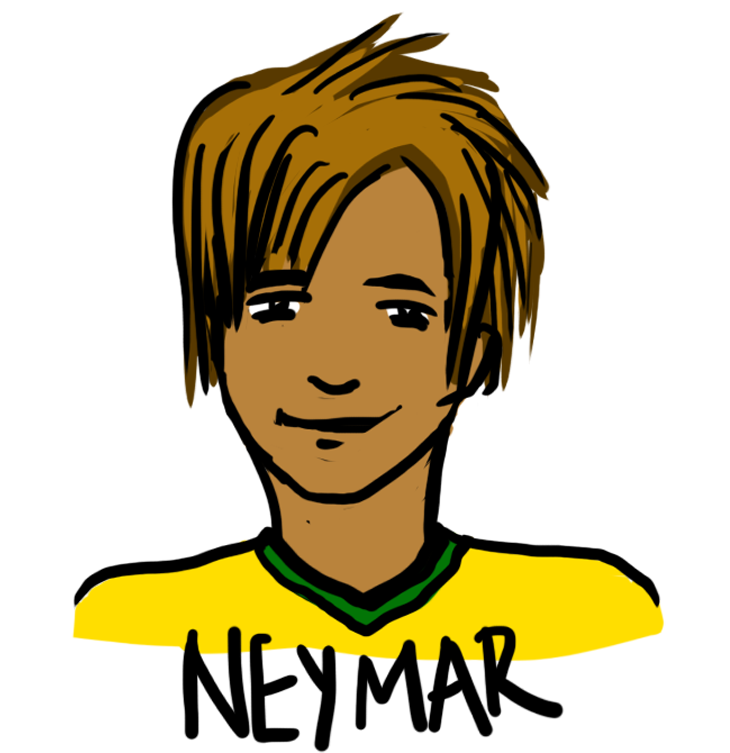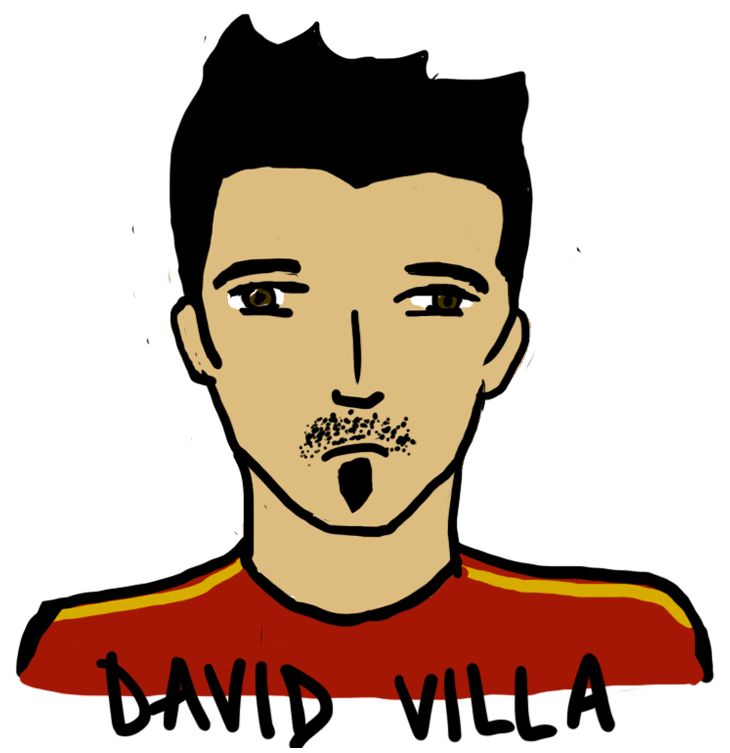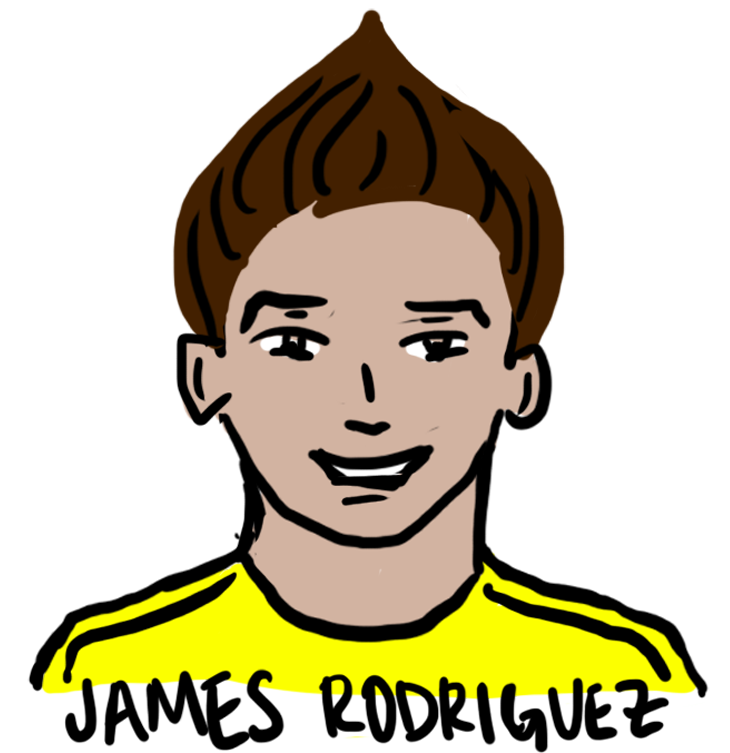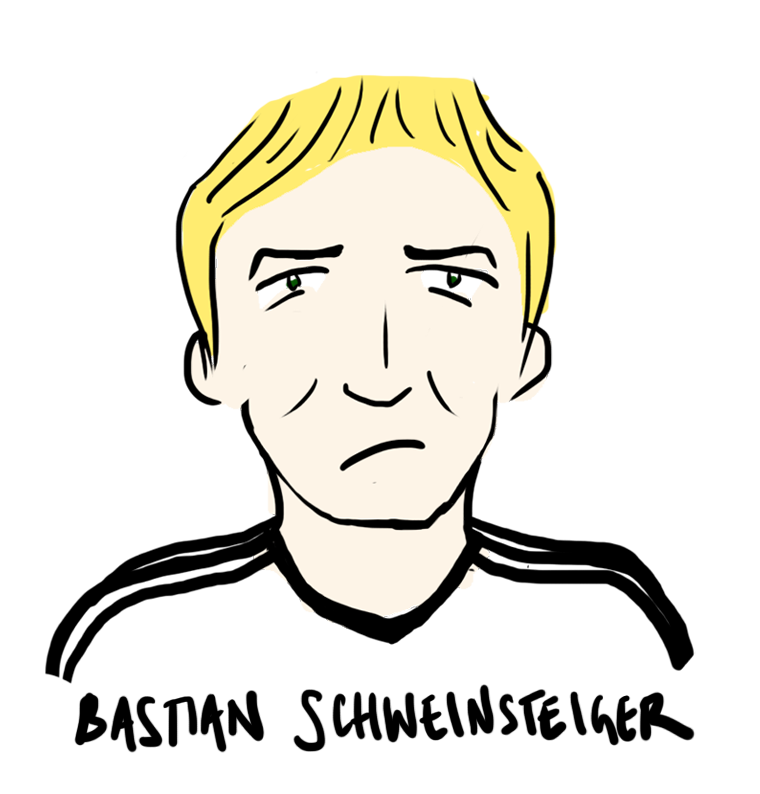by Austin Coats, sports editor
illustrations by Shilpa Saravanan, editor-in-chief
On June 12, one of sports’ greatest competitions, the World Cup, returns to beautiful Brazil–a place where soccer seems as much a part of daily life as eating and sleeping. As shown by history, this group of teams will give their dose of shocks and thrills to the millions of people glued to their televisions around the world; England will have a typically disappointing run, a random team out of nowhere will advance to the semifinals, and the traditional soccer superpowers will find success. This preview provides a short and concise overview of each team that dreams of lifting the trophy on July 13th.
GROUP A

Brazil: Brazil won the Confederations Cup (basically a mini-World Cup) in 2013 with relative ease and has an overall solid lineup with FIFA Team of the Year players Dani Alves and Marcelo in the back four and with guys like Oscar, Neymar and Hulk creating the attack. Do not forget that they are playing in Brazil.
Croatia: Despite not advancing past the group stage in the 2012 Euro tournament, Croatia played strong in their tough group and Luka Modric, Ivan Rakitic, Mario Mandzukic, and Ivica Olic should create enough attacking options to send them through.
Mexico: Mexico struggled at times to even qualify for the cup, and is still having many problems on defense as was made evident in their friendlies with Ecuador, Bosnia & Herzegovina and Portugal building up to the World Cup. Mexico’s hopes to advance from this group are legitimate, but past that, the team will have problems competing.
Cameroon: Ranked 50th internationally, Cameroon will have to find a way to make plays for Samuel Eto’o, which is much harder to do in the World Cup than in an African qualifying group. They can compete in this group, but they will likely leave early.
GROUP B
 Spain: Spain has a few new faces, but they mostly resemble 2010’s World Cup-winning squad–only four years older. Depending on the interpretation, that could be either a good or bad factor for the team that won three straight tournaments from 2008-2012 and reached final of the Confederations Cup, only to lose to Brazil. If healthy, newly added striker Diego Costa may be the key to a another lengthy Cup run.
Spain: Spain has a few new faces, but they mostly resemble 2010’s World Cup-winning squad–only four years older. Depending on the interpretation, that could be either a good or bad factor for the team that won three straight tournaments from 2008-2012 and reached final of the Confederations Cup, only to lose to Brazil. If healthy, newly added striker Diego Costa may be the key to a another lengthy Cup run.
Netherlands: The Dutch have lost a handful of players from their World Cup finals run in 2010 and haven’t performed well in competition since. Robin van Persie still leads the attack, and the midfield, despite losing Van der Vaart and Strottman to injuries, looks like it can assist him, but the Netherlands’ defense remains as questionable as ever.
Chile: Chile poses a huge threat to both Spain and the Netherlands. After a strong qualifying campaign, Chile looks to use Arturo Vidal and Alexis Sanchez in a heavy attacking threat, which might be able to save their weak defense.
Australia: Australia is seen by the other three teams as an easy way to get three points. Ranked 59th, the Aussies show little promise to threaten the strong sides in their group.
GROUP C
 Colombia: While announcing the 23-man roster, Colombia coach Jose Pekerman indirectly told the whole world what they did not want to hear: after trying to rehabilitate a knee injury, striker Radamel Falcao will miss the World Cup. However, Colombia should still make it through the group stage with James Rodriguez creating plays in the midfield for an attacking force that remains fierce.
Colombia: While announcing the 23-man roster, Colombia coach Jose Pekerman indirectly told the whole world what they did not want to hear: after trying to rehabilitate a knee injury, striker Radamel Falcao will miss the World Cup. However, Colombia should still make it through the group stage with James Rodriguez creating plays in the midfield for an attacking force that remains fierce.
Greece: Greece might be the weakest team from Europe in this tournament. Scoring infrequently, Greece qualified by beating Romania in a playoff. While the Greeks could compete for second place in this group, that would be realistically deemed an upset.
Côte d’Ivoire: The Ivory Coast has some great players with Yaya Toure, Gervinho, Wilfried Bony and the legend of club football, Didier Drogba. On paper, they seem like a team that could go as far as the semifinals if fully determined, and they are probably the best squad from Africa. However, they have never advanced past the group stage and have not even won a single African Cup of Nations, so there is a bit of pressure to prove history wrong in Brazil.
Japan: The first team to qualify after the automatic Brazil, Japan should put up a good fight. Shinji Kagawa and Keisuke Honda lead the team that scored often in qualifying, losing only one game. Half of these goals were by striker Shinji Okazaki. If the Japanese continue this trend, they will be a dangerous team fighting to become the first team out of this competitive group.
GROUP D
Uruguay: This team may not produce as well as they did in South Africa, despite a stronger attack with more the experienced Luis Suarez and Edinson Cavani. The team’s defense does not have much to it anymore, and the midfield lacks the creative ability to assist the three forwards. Uruguay was not strong in qualifying, having to go to a playoff with Jordan only to fall into a group that they might not advance from.
Costa Rica: To be honest, nobody seems to know much about Costa Rica. The Costa Ricans just look like a team that benefited from a weak qualifying group and gained enough points during Mexico’s period of implosion.
England: England have such a lovely mixture of young and old talent with the fusion of Frank Lampard, Steven Gerrard, Adam Lallana, Daniel Sturridge, and many others–if they had a kinder World Cup history, it would not be such a far-fetched idea to think they could win this year. However, everyone and everything outside of England hates England, so while they should easily take second in the group, matches beyond that only promise the English fans more wasted money at the pubs.
Italy: Italy’s traditional methodology of defense first may be as strong as ever with Giorgio Chiellini and Andrea Barzagli creating the same brick wall they established at Juventus this season. The midfield is still filled with creative thinkers such as Daniele De Rossi and the ever-accurate Andrea Pirlo. The worry for the Italians is whether or not they can score goals. If new faces Ciro Immobile and Lorenzo Insigne can help the entertaining Mario Balotelli cause havoc up front, then the Italians have a great chance of winning the whole thing.
GROUP E
Switzerland: Switzerland has a squad that is both strong and capable of great and shocking performances, but it is not a squad that deserves to be ranked 8th. Overall the team is full of young future stars, such as its key player, Xherdan Shaqiri. Expect the Swiss to advance through the group stage, but they might have a tough time getting to the quarterfinals.
Ecuador: It is difficult to reason past the feeling that Ecuador qualified because they have a huge advantage at their home stadium in Quito, which is located 9,127 feet above sea level. At home, Ecuador was undefeated, but the Ecuadorians were ripped when they traveled. With their advantage gone, they likely will not make much noise in Brazil.
France: To put the situation in the finest terms, France’s squad is stacked. The team has been revitalized since their nightmare in South Africa; their roster is young and talented and they got rid of the issues that plagued their chemistry, so France looks forward to a long run in the Cup. One issue might be the absence of midfielder Franck Ribery, who was a part of FIFA’s latest World XI. His replacement, Antoine Griezmann, looks to be an adequate replacement as far as skill goes, but Ribery’s experience and leadership seem irreplaceable.
Honduras: It’s unfortunate to write that teams like this have no chance, but there’s no avoiding the facts. Honduras is just another team that qualified from a weak group and celebrated intensely when they beat Mexico during their scuffle. Sure, Cinderella stories are wonderful, but teams like this just are not capable of sufficiently competing in the World Cup.
GROUP F
Argentina: If there was any doubt that Argentina had one of the world’s best attacking sides, confirmation has arrived through Ángel di Maria. Though a part of Argentina’s squad four years ago, di Maria established himself as one of the world’s best players this past season with Real Madrid. His perplexing wing play could help his team push past the quarterfinals after having lost to Germany in the past two Cups in the same round. He complements Gonzalo Higuain, Sergio Aguero, and the amazing Messi. Defensively, Argentina is questionable, but overall this squad has the capability to win the whole thing.
Bosnia-Herzegovina: In their first World Cup since the countries formation in 1992, Bosnia-Herzegovina will rely on Edin Džeko and Vedad Ibisevic to make their first appearance a notable one. Džeko is a relentless scorer from Premier League side Manchester City, and Ibisevic has become a great complement to him. These two players could spark an impressive run for what most see as a weaker team.
Iran: Iran just seems happy to be at the World Cup. Their most notable quality is that they scored a great amount of goals in the first round of qualifiers. However, Iran does not really have an established goal-scorer, and it is in a group with other teams that have better offenses.
Nigeria: While not the favorite to win the group, Nigeria has a legitimate shot to get through to the second round. With John Obi Mikel controlling the flow in the midfield and Ahmed Musa and Victor Moses supporting him on the wings, Nigeria could make an impressive run in Brazil.
GROUP G
Germany: Germany is fully expected to win its group–despite said group being the traditional “Group of Death.” Germany, like Brazil, has options everywhere–Philipp Lahm captains the team and holds down the fort in the back with Manuel Neuer, FIFA’s goalkeeper of the year, while Mesut Özil and Bastian Schweinsteiger command the counter-attack offense. The loss of rising star Marco Reus to a recent injury may seem harmful, but this German side has plenty of ways to replace him.
Portugal: Portugal is a popular choice to be the second team to advance, mostly because they have Ballon d’Or winner Cristiano Ronaldo leading the attack. However, soccer is by no means a one-man game and there are questions as to whether or not Ronaldo makes up for a few holes in other positions. Overall, however, Portugal seems like a team that has potential to surprise even the most optimistic fans.
Ghana: The 23-man roster of Ghana looks scary when it comes to the attacking half. Ghana has many players in the midfield and attacking and with strong resumes in European club play, and most went to the 2010 World Cup, where they played well into their controversial game with Uruguay (in which they were knocked out.)
United States: In such a tough group, the United States should be scared after its last two pre-World Cup friendlies, because its defense is simply not ready for such competition–and especially not ready for the likes of Germany, Portugal, and Ghana. While the American offense does seem like it is capable of netting a few on the World stage, it will have to score early and often in order to compete in this group.
GROUP H
Belgium: Belgium is a team that looks like it could take the Cup out of nowhere. In their first World Cup since 2002, Belgium has a young stud in pretty much every position; Thibaut Courtois in goal, Vincent Kompany leading the back four, and Eden Hazard leading the attack–they should have no problem winning this group.
Algeria: While seen by most as one of the weaker teams in the competition, Algeria has a couple of things going their way. Their first strength is the number of players on their squad who play in European first-division clubs–most notably midfielder Sofiane Feghouli–giving their players experience amongst the best talent in the world. Secondly, Algerian geography challenges these players to put up with temperatures higher than the harsh ones they will experience in Brazil, giving them a physical advantage over many European squads.
Russia: Notably, Russia performed better than Portugal in their mutual qualifying group. Both squades scored a solid 20 goals, with Russia allowing less. Russia was then able to qualify directly while Portugal had to beat Sweden to reach the World Cup. If the Russians continue this strong play, they can snatch the second spot in this group easily or even upset Belgium, despite having lost captain Roman Shirokov to injury.
South Korea: South Korea should be able to beat Algeria and Russia with a technically strong squad. A fascinating player from the Bundesliga, Son Heung-Min could lead this team to second in the group–and to a few upsets.
Beginning June 12, catch the entirety of the World Cup on NBC, ESPN and Univision.


